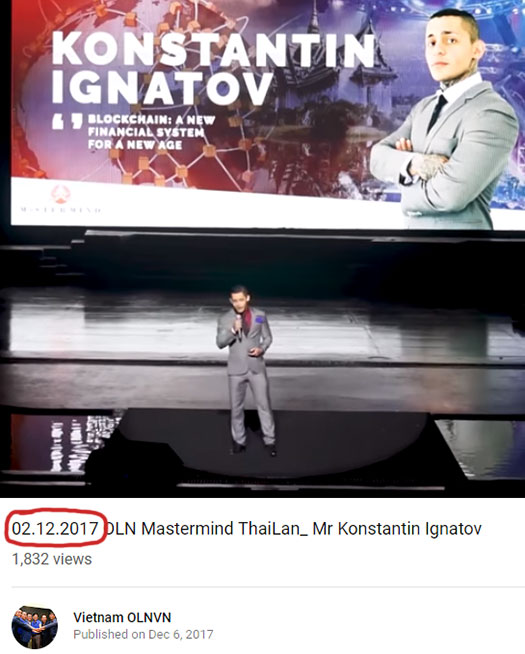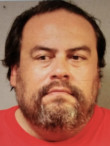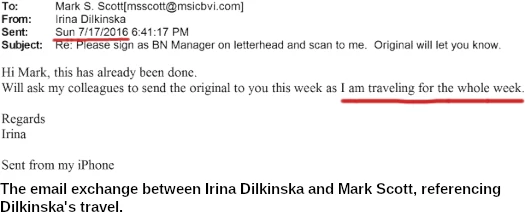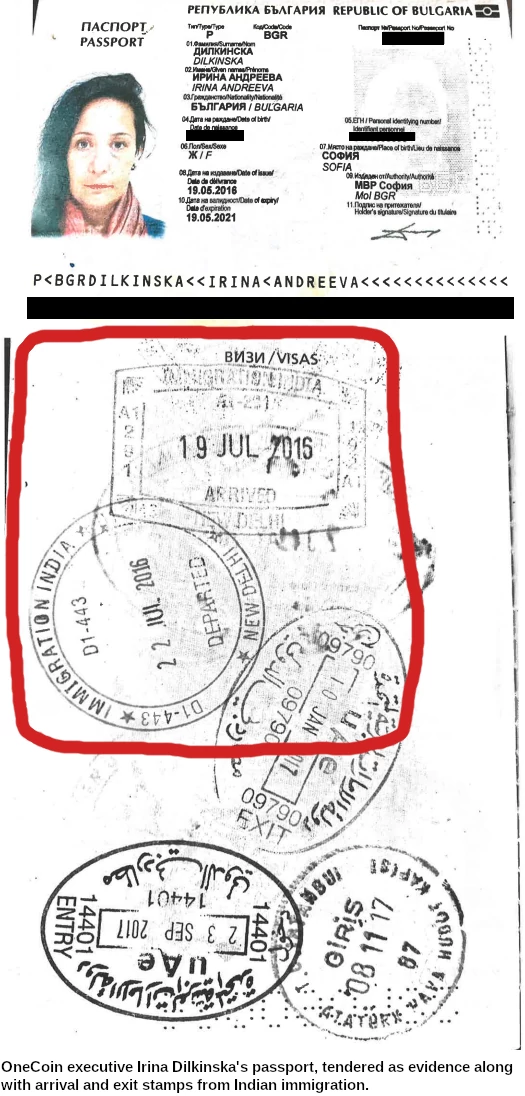Mark Scott’s case for a OneCoin retrial
 On December 15th, Mark Scott finally filed his case for a OneCoin retrial.
On December 15th, Mark Scott finally filed his case for a OneCoin retrial.
Scott was convicted in November 2019 and seeks to overturn his conviction.
Arguments raised by Scott in favor of a retrial focus on two instances perjury by witness Konstantin Ignatov, and how the perjury allegedly impacted the jury’s guilty verdict.
Konstantin Ignatov is the brother of OneCoin founder and former CEO Ruja Ignatova.
When Ruja fled in late 2017, Konstantin went from being her personal assistant to CEO of OneCoin.

Konstantin was arrested by US authorities in March 2019. Part of Konstantin’s guilty plea, entered into later that year, saw him agree to full cooperation with US authorities.
That pledged cooperation saw Konstantin produced as a witness in Mark Scott’s OneCoin money laundering trial.
News of Konstantin committing perjury broke back in September.
The first instance pertained to Konstantin’s OneCoin work laptop, which he testified he threw away.
In actuality Konstantin gave the laptop to Duncan Arthur, who he was travelling with at the time.
Arthur travelled with it back to Bulgaria and turned the laptop over to OneCoin.
Konstantin’s girlfriend then arranged to have the evidence on the laptop destroyed.
Arthur made a copy of the evidence before it was destroyed.
Arthur stated that on the laptop were “many details about OneCoin’s financial dealings in London, Dubai, Sofia, and the disposition of assets including bank accounts, investments related business
ventures, valuables and real estate in billions of dollars.”
In July 2020 Arthur turned the laptop evidence over, as part of “eight boxes of OneCoin material”, to UK and US authorities.
The DOJ is believed to have learned of Ignatov’s laptop perjury in June 2021, via another report sent to them by Duncan Arthur.
The Government failed to disclose this reported perjury … with the Manhattan DA investigator claiming, quite disturbingly, that he had “got busy with other things” and believed that Mr. Scott had been sentenced to jail already.
 The second instance of Konstantin’s perjury pertains to a meeting between Mark Scott (right) and Irina Dilkinska, a OneCoin executive.
The second instance of Konstantin’s perjury pertains to a meeting between Mark Scott (right) and Irina Dilkinska, a OneCoin executive.
In his December 15th motion, Mark Scott’s attorney writes;
Dilkinska was more than 3,000 miles away in New Delhi on the date in question, as travel records definitively prove.
Scott’s attorney goes on to claim DOJ Prosecutors were aware of Konstantin’s perjury at the time.
Worse, the Government was aware during trial that the story Konstantin was spinning for the jury about the Dilkinska meeting in Sofia was almost certainly false.
E-mails from the Government’s discovery, which the defense identified for the Government while Konstantin was still testifying, made clear that Dilkinska was almost certainly not in her home city of Sofia when Mr. Scott visited OneCoin’s offices there on Wednesday, July 20, 2016.
In addition to travel records, Scott’s attorney references an exhibited email exchange. that took place at the time of the alleged meeting.
The exchange took place during the time of the alleged meeting in Bulgaria. In the exchange Dilkinska tells Scott she’d be “traveling for the whole week”.

The email exhibit was rejected for Scott’s trial, on the basis it was “clearly inadmissible hearsay” and lacked “independent corroborating evidence”.
That evidence wouldn’t surface until earlier this year.
A source provided the defense with a copy of Dilkinska’s passport with stamps showing that she was in India on the date of the meeting, a passport that counsel for Dilkinska has confirmed is accurate.
Counsel for Dilkinska then provided the Government with a video of Dilkinska herself flipping through the pages of the passport.
Finally, on December 3, 2021, the Government informed defense counsel that Indian authorities had confirmed the accuracy of the passport stamps:
Dilkinska arrived in India on July 19, 2016 and departed on July 22, 2016.
OneCoin’s supposed head money launderer was most certainly not in Sofia on July 20, 2016, much less at a meeting in OneCoin’s offices with Mark Scott, as Konstantin had told the jury.

Dilkinska worked directly with Ruja Ignatova. Her attorney working with Mark Scott’s defense team is an interesting development.
Dilkinska, Konstantin claimed, was “in charge of creating and managing fake companies for the company OneCoin,” the purpose of which were to “create bank accounts . . . for the money laundering purposes.”
If Dilkinska is a person of interest in the DOJ’s ongoing investigation into OneCoin, they haven’t made that public.
It should be noted Scott’s attorney makes a big deal about an illegal phone Konstantin obtained in prison (it seems OneCoin defendants have no problem gaining illegal access to cell phones).
I’m not aware of any revealed evidence pointing to anything on Konstantin’s seized phone pertaining to Scott’s trial.
Scott’s attorney puts forth that Konstantin’s perjury resulted in him being denied a fair trial.
These multiple confirmed instances of perjury cast grave doubt on the entirety of Konstantin’s testimony, including his claims that Mr. Scott
was “one of the main money launderers for OneCoin.”Had the jury known that Konstantin had blatantly lied about the fictitious Sofia meeting with Dilkinska as well as the destruction of the OneCoin laptop, the entirety of Konstantin’s testimony would
almost certainly have been discredited.And if Konstantin was so quick to lie on two occasions, the jury would have had grave reason to doubt Konstantin’s broader testimony that Mr. Scott was a “money launderer.”
Were the jury to disregard all of Konstantin’s testimony – or at least all testimony inculpatory to Mr. Scott that was not otherwise corroborated – there can be no confidence it would have returned the same verdict.
In late September, the DOJ claimed Konstantin’s perjury was “not material” to Scott’s guilty verdict.
The DOJ put forth Konstantin’s perjury,
amounting to only a small piece of Ignatov’s testimony and regarding an event that took place after the charged conspiracy and was unrelated to Scott’s guilt, was not material to the jury’s verdict.
Ignatov’s full testimony had limited relevance to the key issue in dispute at trial, i.e., Scott’s knowing participation in the charged criminal conspiracies.
The evidence submitted by the DOJ, resulting in Scott’s conviction, extended well beyond Konstantin Ignatov.
A decision on whether Mark Scott will be granted a retrial remains pending.
Update 26th December 2021 – It’s going to be a few months yet before we get a decision on Scott’s retrial motion.
Citing “multiple issues and grounds for relief not raised” not raised previously, the DOJ has requested permission to file a sur-reply.
Scott has consented to the request, and in exchange will have the opportunity to file a response to the sur-reply.
The DOJ’s request was approved on December 22nd, giving them until January 28th to file. Scott will then have until 18th February to file his response.
Update 12th April 2022 – On March 30th the DOJ requested an oral argument hearing now that Scott’s retrial filings are all in.
On April 7th the court scheduled oral arguments for April 14th. On April 8th the hearing was rescheduled to April 25th at DOJ’s request.
Update 19th September 2023 – Mark Scott’s motion for a retrial has been denied.


I can see Scott getting a retrial. It hinges on whether the court thinks Konstantin’s testimony outweighs the rest of the evidence.
A retrial will result in the same conclusion (let’s face it, there’s too much evidence), but Scott will get to stay in house arrest for however long that takes.
It is quite obvious that Konstantin is a lying bastard and the court will probably agree that he is an unreliable witness.
So I also think it’s very likely that Scott will get a retrial, but this should not change the outcome, as Scott is guilty as hell.
Scott is as guilty as hell. If the process was flawed however… It would have been sickening if Ignatov got a lighter sentence though
It’s mind blowing that Konstantin keeps lying even way after the trial..
About the content of the laptop:
And about Konstantin’s contraband phone content:
Konstantin has been really digging deeper and deeper hole for himself.
As a former California criminal defense attorney, I can tell you it is better this comes out at this stage.
Worse case there is a new trial. But if post sentencng could be a successful Writ of Habeus Corpus that would overturn everything.
The Exhibit G-1(storage.courtlistener.com/recap/gov.uscourts.nysd.482287/gov.uscourts.nysd.482287.434.7.pdf) which features correspondence between Ruja Ignatova and Sebastian Greenwood indicates that the reason for Irina Dilkisnka’s travel to India was likely related to TradeNext deal.
In the exhibit, Sebastian writes to Ruja:
Tradenext is an FX platfrom with roots to India operating from UK, which had FCA license until 2018(register.fca.org.uk/s/firm?id=001b000000NMfICAA1). It was possibly planned as a the OneCoin forex which Ruja talked about at the 2016 Wembley arena presentaton.
Irina and Mark Scott were the principals of Irish company Fenero Tradenext Holding Limited. Apparently, Ruja’s plan was to use this Irish holding company to buy Tradenext.
On page 7 of the “Full accounts made up to 31 March 2016” of Tradenext Ltd (find-and-update.company-information.service.gov.uk/company/07193407/filing-history/MzE2MDU0MjY0NWFkaXF6a2N4/document?format=pdf&download=0) — dated on 20 July 2016, i.e. when Irina was in India — it’s revelead that “the firm is in negotiation with third party buyers which will trigger a s178 notice for a chage of control shareholding in the company.”. This is very likely Ruja-Mark-Irina.
The Companies House records don’t reveal what was the result of the negotiation. Scott at least transfered over €10 million to the Fenero TradeNext Bank of Ireland account, accordintgto the SDNY court documents.
But there seems to have been some link between Tradenext and OneCoin. I’m not sure if this relates to (also) actions before the planned Mark-Irina Tradenext deal, but the owner of Tradenext, Jagjeet Singh, was investigated for a cryptocurrency related “Chit Fund” investment scam in India in which OneCoin is mentioned too:
(indianexpress.com/article/cities/chandigarh/credit-crown-chit-fund-scam-accused-operating-from-uk-thailand-malaysia-dubai-says-crime-branch-5061618/)
Another article(tribuneindia.com/news/archive/features/chit-fund-scam-sit-identifies-182-culprits-400662) covering the case says the criminals were using hawala system to transfer the money and that “They are also operating 1Coin.eu, which the police say was a sister concern of Crown Credit Cooperative Society.”
Hawala is know to be a preferred money laundering method for drug traffickers. If Mr Singh was moving Ruja’s money, there is a good chance that Taki’s cocaine money got moved there too.
Cryptocurrency is the preferred method for drug dealers to move assets.
The allegation against Hristoforos Nicos Amanatidis “Taki” is in play:
twitter.com/CryptoXpose/status/1472032714404601857?fbclid=IwAR12wm7XhNoOUO1wqyf88ShJJ4SmR9xhSuWZOeaEffHz6M0dYrC4934aFhQ
Does anyone know where Konstantin is right now?
How on earth do you get bailed after being caught in jail with a contraband cellphone?
Plus he lied on his visa application, lied to immigration, then made up some stuff for the FBI, then Pre-Trial Services, has two slam dunks for perjury on the stand, lied about what was on the laptop, lied about what was on the contraband cellphone. And probably more
And surely admitting one case of perjury and then being caught out in another should send you back behind bars?
Konstantin’s still under house arrest AFAIK. He’s expected to return to custody at some point but there hasn’t been any publicly available updates.
Latest One Ecosystem Newsletter announced the new CEO name: Ventsislav Zlatkov
According to the newsletter, he is going to make a video announcement soon.
us9.campaign-archive.com/?u=cf9659fd672fe664d487e7e1b&id=98458a244e
Just checked, and Mt Zlatkov (“slut-cow”) doesn’t hold CEO position at least in any of the known Bulgarian OneCoin companies (yet). Foxi is still the patsy king there.
I also wonder has King Jayms been demoted(or even quit) as the Captain’s Corner hasn’t appeared on the newsletter latetly.
His “Global Mentorship” webinars haven’t been uploaded on Youtube for weeks either, but is this because KJ stopped organizing them or the promoters just decided there is no point uploading them anymore?
Given there surely can’t be any money in it, can we refer to OneCoin CEO as a volunteer position?
Article updated to acknowledge delays in an order (~March 2022 onward).
I believe Foxi will remain to be the stooge-manager of the companies on business register.
KingJayms has been doing the webinars every Saturday, last time yesterday. It’s just nobody is uploading those online anymore after OneJapan channel’s Jose Sugawara who was handling it, stopped being active in mid November.
China, Vietnam and Latam are bringing in some money. The MLM has recovered a bit, after they created a new cash accounts which started from zero, and started paying bonuses again.
The OneCoin BTC accounts I’ve been following do indeed show that money still keeps pouring in. During this month alone, the incoming BTC volume to the two most active accounts has been 38.5 BTCs. That’s close to two million dollars with current BTC value.
The 117 BTC OneCoin loot they stashed in October on to a single account remains untouched. Perhaps it is reserved for the CEO compensation. 😉
And Binance & Bitforex also continue to be the key OneCoin money launderers, but there are some new ones like Okex.
$2 million a month? Who are these braindead recruits?!
@WhistleBlowerFin
Ventsislav Zlatkov could be an employee in the IT department at OneCoin.
share-your-photo.com/c25d4aa8a3
share-your-photo.com/00681401a9
linkedin.com/in/vzlatkov/?originalSubdomain=bg
Ugh. DOJ has requested permission to file a 60 page long ass sur-reply.
After which Scott’s defense will request “to exceed the length limitations in the Court’s individual practices in its response to the Government’s sur-reply”.
I’ll look over the DOJ’s filing and see if there’s anything interesting. Otherwise just wait for a decision on the original retrial motion.
The Mark S Scott OneCoin court battle continues:
courtlistener.com/docket/7829201/united-states-v-scott/?page=2#entry-445
57 pages 🙁
Thanks. Will have a look over it tomorrow.
So… the Government says Konstantin might have been wrong about the date of the Sofia meeting.
And: it doesn’t matter because the Defence knew that at the time of the trial that Ignatov fudged the dates. The Defence is time-barred anyway for a S33.
Allegations that evidence was not forthcoming or fudged is complete BS.
Everything against Scott is still absolutely overwhelming and the clandestine phone, lies about laptops, content thereof and what’s in the boxes don’t add to much because Scott is so guilty it’s ridiculous.
The govt’s reply is mostly boring procedural discussion, arguing against Scott’s assertions. I imagine Scott’s reply will just repeat what he already put forth in the retrial motion.
Thinking I’ll save the article for the ruling otherwise I’ll just be repeating what’s already published.
It’s interesting the DOJ mention evidence obtained from Greenwood and that they chose not to include any of it in Scott’s trial.
I’m reading that as if a retrial is order, we can expect Grennwood to replace Konstantin. Greenwood knew a lot more about OneCoin than Konstantin did.
Overall, and I’m not a lawyer, I’m confident Scott’s not getting a retrial but the court might grant it on some technicality.
Some remarks about the new DOJ filing:
– Scott’s calender entry for the July 2016 meeting was “Dr. RI and Krasimir Re Forex. Irina Re transfers and governance. Review SH Agt for tradeNext”.
Referring to my comment #6 in this post, its seems not only was Irina in India in connection to the TradeNext but Scott’s meeting with Krasimir Yordanov (the iRujaInvest guy –>
https://behindmlm.com/companies/onecoin/ruja-ignatova-disappeared-with-230000-btc-lawsuit-alleges/#comment-437973“) and Ruja in Sofia was about TradeNext too.
It’s interesting that DOJ only now revelead this context of the July meeting. TradeNext and PCT were only fleetingly mentioned at Scott’s trial, but I think they may be prominent aspects of DOJ’s investigation in which Scott was clearly involved but are better covered in someone else’s trial.
The Exhibit B has David Pike correspondig with Dilkinska about Isle of Man companies related to OneLife Network and Xcoinx, and this IoM stuff wasn’t brought up in the trial either. (IoM OneLife entity outlived the Belizean one, for it was dissolved in May 2019: opencorporates.com/companies/im/013964V)
It kinda seems that schemes which have some nexus to Scott and were covered in detail at Scott’s trial was only tip of the iceberg.
BTW, Oz has reviewed MLM scam of former TradeNext CEO Moshin Jameel which he did after Crown Credit Cooperative Society and its “sister-company” OneCoin(see again comment#6):
https://behindmlm.com/mlm-reviews/bitsolives-review-buxcoin-ponzi-points-investment-fraud/
– FBI was unable the access the contents of K’s Feb 2020 seized contraband phone until October 2021 when K gave them the passwords via his lawyer. Strange.
– FBI didn’t copy the contents of K’s laptop.
– “Contrary to Arthur’s recollection […] the Government found no evidence of the Laptop or its contents in the U.K. Boxes.”
– Sebastian Greenwood’s case has been quite mysterious. But something new about it was revealed in the filing, like the more exact timing of his arrest as July 2018.
It was also revealed that in Sep 2019 Greenwood waived attorney-client privilege to all OneCoin related communications. Is this an indication that they had reached a co-operation agreement or why else he would done it voluntarily?
“The Government did not intend to call Greenwood as a witness at trial” could also be interpreted as that that calling Sebastian as a witness was an option for DOJ — thus a co-operator?
Nevertheless, it’s shrouded in mystery what was going in his case between July 2018 and April 2020 (when his case was unsealed), but when his case was unsealed, it was clear that Greenwood had no plea deal.
I get why there’s secrecy (Ruja’s status unconfirmed and Schneider yet to be secured on US soil), but it’s made it terribly difficult to piece together what’s happening.
The constant judicial delays haven’t helped either.
I wonder if it’s a mere coincidence that Bitsolives and OneLife back offices looked so similiar:
justpaste.it/3kros
Upaycard which Bitsolives used was connected to Robert Courtneidge’a Moorwand company(finextra.com/pressarticle/72185/moorwand-and-gps-partner-to-launch-upaycard-in-uk). Another funny coincidence(or not).
Many other MLM scams seemed to have used Upaycard, as Oz has covered here…
Article updated with Scott retrial oral arguments hearing date.
While it seems prosecutors may have done less than a stellar job, this scumbag deserves to rot in prison with the rest of the OneCoin scum that stole from the poorest people in Africa in order to make themselves rich.
Hope Scott is enjoying his prison showers.
Scott is unfortunately out on 24/7 home detention pending the outcome of this mess.
Whatever happens to any of the defendants, it needs to be based on an ethical process. If the evidence is there, without the SDNY bending rules and commuting ethical violations, why not have a new trial?
Scott is a small fish compared to Greenwood, Armenta and Ignatov. He is not even charged with the wire fraud.I still wonder why Scott was not questioned or used to testify against them instead of the other way around.
The SDNY seems to take its sweet time with the prosecutions and sentencing of Ignatov and Armenta, respectively. Ignatov still not even remanded after several proven bail violations and perjury, Armenta receives more favorable bail conditions that allow him to better continue his fraudulent business instead. Really, what is going on?
Hopefully the SDNY did not commit prosecutorial misconduct so grave to impact all OneCoin cases. AUSAs DiMase and Folly, who together with their team, according to Scott’s latest motions allegedly committed various unethical acts, worked on all of them.
Judge Ramos presides over them all. It is hard to imagine that he would let the standing prosecution team continue its efforts if he finds them less than honest.
Oh come on!
Scott tried to launder almost $ 200 million. He’s obviously guilty regardless of who else did what on or off the stand and no other court would come to a different conclusion. Scott lied to banks and the FBI by accident then? His attempt at a retrial is a longshot. He can still appeal or review.
How would you know that Ignatov isn’t remanded or in some kind of custody?
Scott pleaded not guilty. Do you understand that this means he couldn’t be used as a cooperating witness?
Scott also lied to investigators and bent his bail conditions. These people all stink. You cannot paint him as being somehow more virtuous.
@Stevie
Oz wrote on Dec.03, 2019:
https://behindmlm.com/companies/onecoin/onecoin-lawyer-claims-konstantin-ignatov-released/
PS: The difference between the dollar and the euro is only small.
@Stevie, this blogs are only useful if you don’t simply ignore uncomfortable truths and the law.
I understand that many people are angry for having been defrauded and maybe you are one of them. However, the law is the law.
Ignatov was the SDNY’s star witness at Scott’s trial and he lied more than once with certainty.
If the SDNY has all the evidence it claims, a retrial is nothing more than a nuisance and he will be found guilty again.
What everyone seems to ignore is that the SDNY prosecutors allegedly ignored their ethical duties several times in this case, including being aware of perjury by Ignatov during trial and not exposing it to the court and the defense.
That is what I care about. Find these OneCoin folks all guilty, but appropriate rules must apply.
The Federal Government has all the power as it is. It need not be amplified by unethical prosecutors trying to pad their conviction records.
There is nothing “uncomfortable” about this for me. Except that a fat twit is delaying what is coming to him.
It’s uncomfortable for Scott. No court will find any differently and the star witness perjuring himself multiple times cannot convince any reasonable person that even if he had not, Scott would not be convicted.
If Ignatov gets replaced by Pike in a retrial, it would be even worse for Scott.
A retrial is a massive waste of resources that only makes the victims have to relive the trauma, gets Scott a few more years to spend the cash at the buffet or hide it, and earns Devlin-Clown more fees as the attorney apparently best at clutching at straws and being paid with cash that should be returned to victims. While every other action is delayed.
Either way, Judge Ramos decides and neither you nor I. I get the impression Scott is going to die behind bars and that process will start in his immediate to medium future
@Stevie, you have not taken a position on anything I said. I am discussing ethical issues concerning overreach and misconduct by the SDNY, not the determination of Scott’s guilt. There have been several substantiated allegations of misconduct, a pattern of violations really.
As a side note, the decision about whether to grant a new trial, which Judge Ramos has to make, legally has NOTHING to do with Scott’s guilt or innocence under controlling law.
Oh, I’m sorry. Here’s a position: I don’t give a fuck.
“Overreach and misconduct by the SDNY…?” I don’t care. Nobody except Scott does. Hiya doing Mark?
Scott is guilty as the night is black.
Now get lost
Believe what you want. Hundreds of defendants daily depend on the Federal legal system to be just. Any allowed deviations by prosecutors from ethical obligation causes innocent people to be robbed of their liberty.
Again, for someone like you, who seems to incapable of grasping overarching concepts, it’s not about Scott’s guilt or innocence. It’s about curbing federal prosecutors from knowingly using perjured testimony in lieu of verifiable evidence.